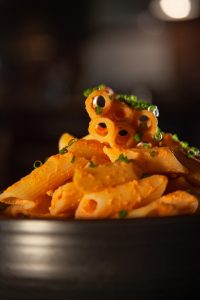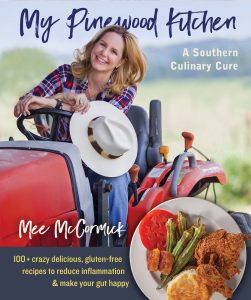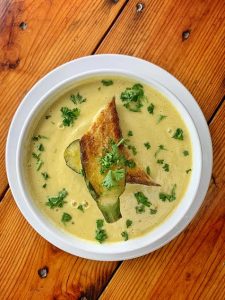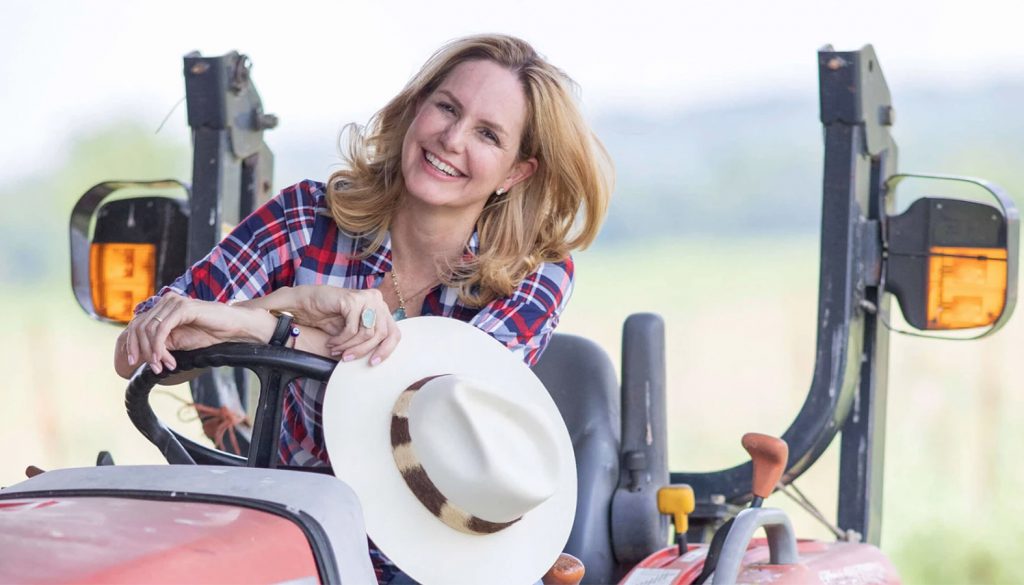Mee McCormick knows the meaning of the word “healing.”
After battling a host of digestive complications since birth, the wife, mom, and rancher in rural Tennessee decided to cook herself a cure. Since then, she has become a restauranteur, published author, and expert in healthy cuisine.
McCormick’s latest book, “My Pinewood Kitchen: A Southern Culinary Cure,” (Simon & Shuster, $27) draws readers into her professional and personal experience. In a little less than 300 pages filled with photos of southern skies and fresh foods — not to mention phrases like “gut homies,” “supa salads,” and “y’all” to make you feel at home — McCormick shares her journey toward learning her body’s needs, running a restaurant with her family in their small town of Pinewood, and building community through their kitchen.
Besides more than 130 recipes — all of which are gluten-free, and several of which accommodate other dietary needs — McCormick explains the guiding principle behind her culinary approach: a better understanding of the human microbiome (the body’s collection of intestinal bacteria) and the kinds of food that help it thrive. But what makes “My Pinewood Kitchen” more than a science-backed cookbook is the emphasis on fostering relationships, generosity, and joy through every meal.

In a phone interview, McCormick described her outlook on cooking with kindness and serving others. Here are some excerpts from our conversation. Quotes have been edited for grammar and clarity.
Sophia Martinson: The dedication page of “My Pinewood Kitchen” includes this phrase: “Don’t be distracted wondering where you will go, but be present and grow where you are.” What led you to express this thought at the very beginning of your book?
Mee McCormick: First of all, I’m the epitome of forward-moving energy. In Spanish, the best word is “adelante” (“forward”) — you say that to someone when you welcome them in. You move forward. But there's a problem with that because when you’re always forward-moving, you're always wondering, “Well, where am I going to go next?”
I meet so many people who want to change their food and are thinking, “OK, so what’s next?” or “How fast am I going to get well?” We’re missing the moment! We get so caught up in worrying about what’s next that we can’t really reach fruition where we are.
It's like a bell pepper — I'm always shocked that people like green bell peppers, but a green bell pepper is not a ripe pepper! It’s picked way before its time, it gives us indigestion, it’s not ready. It hasn’t had time to reach what it’s meant to be.
Pinewood is not where I thought I wanted to be. To be quite frank, it was not cosmopolitan enough, and I didn't think I could do anything important there. But by allowing myself to be there, I have allowed myself to grow, and I’ve grown into a really great bell pepper!
Everybody wants to be the tulip or the rose — and I wouldn't mind being a tulip or a rose! — but my thing is I just want to become whatever it is that God created me to be. And sometimes we can’t do that when we’re so distracted with what’s next, what’s going to happen, and how fast it can happen. Pinewood is a slow food movement, and that’s a big deal.
Martinson: Food is often seen as a way to bring people together. But sometimes unique diets can become individualized, especially when people have different preferences or are “picky eaters.” How can aspiring home cooks make healthy eating a family affair?
Mee: The first thing that I always say is, “Start with you.” You do it, you change your food as the mother, as the father, as the grandmother, the aunt, or the uncle — whoever’s running the house or whoever has the desire to see the change. You get up in the morning and you make that smoothie. You cook the soup, and you eat the chicken that’s made with a different flour — you do it!
As humans, we are always searching for a mirror. And so the only way that we can be a true mirror is if we have completely cleaned off our filter. And then we can be this clear reflection. So you run the kitchen, you cook the food, and you have joy when you do it. And then, allow others to witness you. We learn through testimonials of action. We really have to be the change, and we have to be the grace. And then it’s fantastic to watch your family join in — and for me, now my community.
If you are the example, your children will follow. And they’re going to follow because you’re going to feel better, because you’re happy, and because they want to participate with you. And so as I cook, I bring my kids in. Even if they’re doing homework, and I’m doing all the cooking, I’m just talking about it: “Oh my gosh, let me tell you what I'm trying!” or, “Oh, you gotta try these noodles. This is amazing!” It’s not to be run like a military kitchen; you just change your energy in the kitchen for them to see your joy. Trust me, everybody wants a drop of someone who has joy.

Martinson: In describing your culinary journey, you write that “anything I did with my newfound wellness must be connected to my service to others.” Why is this connection between personal well-being and service important? How has it shaped your approach to your work?
Mee: I was raised by a very devout Catholic grandfather, and I was always told to never turn anyone away, because they really could be the Master in disguise. I was raised not to judge other people. When I was sick I prayed, and I crawled on my knees to the Basilica of Guadalupe with my grandfather in Mexico City. And he said to me, “Do not ask her to heal you. Ask her to show you a way.” And that sums up how I was raised and who I am.
I’ve never asked for anyone to do anything for me. I have asked to be led. I’ll never forget the moment as we crawled in: I bowed my head before the “tilma” (“cloak”) of Guadalupe, and I prayed for guidance. And I remember praying, “If you can take this thing away, then I will serve.” Well, I didn’t know I was going to literally be serving plates of food!
Pinewood is my service, and it has given me another level of healing. It’s given me a sense of belonging, which is the greatest peace. I think a lot about being of service, especially in a time when people feel so distraught and lack a sense of belonging because they can’t go and seek it in the traditional ways that we’ve been accustomed to: bars, movie theaters, dinner parties, church. Connection is everything. But if you can serve people in this time, then you can have that connection.
Most of the kitchens I’ve ever worked in are run on high anxiety. If you’re going out to eat dinner, and all that food was just prepared and handled by the most anxious hands in the room, that’s not good for your body! Food is meant to nourish and nurture. But you can’t be nurturing when you’re so anxious, crabby, and frantic. That’s why a lot of people go out to eat and feel bad afterward, because that poor girl who’s standing back on the line [in the kitchen] is being screamed at by the chef.
I believe that hospitality is not how you only treat your customers, but it’s also how you treat your team. The same way that you must speak with a customer is the same way you must speak with people who work for you. I do not have an “on-off switch.” I treat the woman who has worked with me in the kitchen exactly the same as I treat Sen. Bill Frist when he’s sitting at my table. It is really important to show one another kindness, respect, empathy, inclusivity, generosity, patience, and love. … My food is my ministry. My restaurant is my ministry.
Martinson: What do you recommend from your book for someone who’s just learning to cook?
Mee: When you’re diving in for the first time, just read my story. Every person that I meet, I attempt to see some part of myself in them. And I really hope that when people read my book, in Part One they see me in them.
And then, read the science part, which is Part Two of the book. Read about why we change our food. And as you go through the recipes in Part Three, find the one that you relate to the most, and start there.

Because most grocery shopping is being ordered online, you can easily get most of the ingredients. I actually put a page up on Amazon because I wanted to find a way to help people find some of these bizarre ingredients that live in Pinewood. So if you go there, you can get it ordered. But it doesn’t take a lot of strange ingredients. There are a couple of things in there that people may not be familiar with, but not many. Just pick one recipe that you think you can handle, and start there.
And then, make it yours! I wrote about microbiome science for a reason: we are all individuals, and we have different ways we need to eat. So there's not one way. I don’t believe being vegan is right for everybody, but I also don’t believe it’s wrong for everybody. I think it depends on you. Same thing with paleo or keto. It’s really about knowing your body, knowing what you can do, and just trying. And I feel like if one person picks one recipe out of my book, and they master it, and they love it, then I’ve hit a home run!
* * *
At the close of her book, McCormick notes that the community at Pinewood has helped her find “another level of healing, not just in my body, but in my heart and spirit.” By combining her experience, expertise, and energy, this cookbook ventures to offer the same to a variety of readers.
“My Pinewood Kitchen: A Southern Culinary Cure,” is available for purchase online. Learn more about Mee and Pinewood at pinewoodkitchenandmercantile.com.

